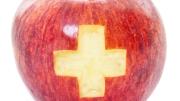The old adage “An apple a day keeps the doctor away” now has science to back it up: Harvard researchers have found that rutin, a substance contained in that fruit (as well as in onions, buckwheat, and tea), has potent anticlotting powers that could help prevent heart attack and stroke.
Researchers discovered rutin’s antithrombotic property when they screened a set of 5,000 compounds for their ability to block the action of a key protein involved in the formation of vessel-clogging blood clots. When rutin rose to the top of the list, “It was very surprising, and we still don’t understand exactly why it is so potent,” says associate professor of medicine Robert Flaumenhaft, the study’s senior author.
What’s more, rutin could be effective at preventing both the arterial clots that cause heart attacks and strokes and the venous clots that cause deep-vein thrombosis and pulmonary embolism, even though the two types form by somewhat different mechanisms. Existing anticlotting drugs (aspirin, Plavix, Coumadin/warfarin) target one clotting mechanism or the other.
Indeed, if scientists had tried to design a clot-preventing molecule, they could scarcely have created one more perfect than rutin. The protein it blocks—PDI (protein disulfide isomerase)—is essential for protein folding, a critical activity within every cell of the body. Rutin inhibits PDI activity only outside cells, where the protein’s clot-promoting activity takes place.
Health-conscious consumers may be familiar with rutin: it is one of a class of substances called flavonoids (known primarily as antioxidants that may help prevent cancer and slow aging), and is already sold as a nutritional supplement. Because the Food and Drug Administration has already granted it “generally recognized as safe” status, fewer regulatory hurdles apply to the clinical trial Flaumenhaft and his colleagues are beginning to conduct.
Research in humans has not yet compared rutin directly with widely used antithrombotic medications, but one thing is already clear: those medications are not effective enough on their own. People who have one heart attack or stroke are usually prescribed one of them, yet each year there are 400,000 recurrences—a subsequent heart attack or stroke in a patient who’s already had one—in the United States. “Thrombotic disease kills more Americans than cancer, than HIV, than anything else,” says Flaumenhaft. “If you have a drug that improves upon existing options by even 2 or 3 percent, that would still be many thousands of lives saved.”









